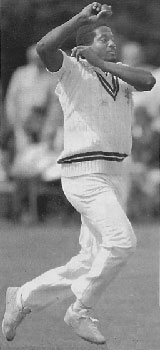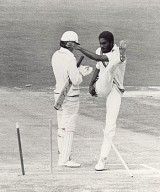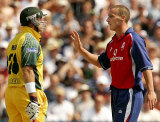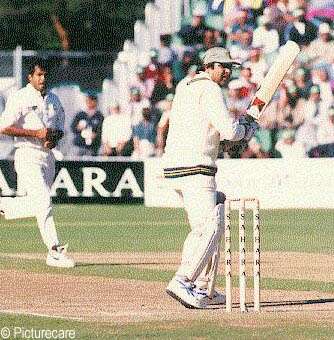Random acts of violence
As Zinedine Zidane so memorably demonstrated in Sunday's football World Cup final, tempers can fray rather easily in the world of competitive sport. With that in mind, Cricinfo presents eleven instances when emotions spilled over into something more drama
Andrew Miller
11-Jul-2006
As Zinedine Zidane so memorably demonstrated in Sunday's football World Cup final, tempers can fray rather easily in the world of competitive sport. With that in mind, Cricinfo presents eleven instances when emotions spilled over into something more dramatic than your average tete-a-tete. Outraged by our selections? Go on, let us
know.
Sylvester Clarke - Pakistan v West Indies, Multan, 1980-81
Clarke played just 11 Tests in an under-fulfilled career. He was, according to Wisden, "as clinically fearsome as any of his colleagues," but all too often his menace with the ball spilled over into something more spiteful. Never more so than at Multan at the tail-end of a tough tour of the subcontinent. Clarke was fielding at fine leg when he was struck by an orange thrown from the crowd, and snapped. He picked up the nearest object, which happened to be a brick, and hurled it over the fence. It struck a 22-year-old student, Shafiq Ahmed, on the head. As he was rushed to hospital, play was halted for 20 minutes by the irate crowd, until West Indies' captain, Alvin Kallicharran, pleaded on bended knee for calm.
|
|

|
Dennis Lillee and Javed Miandad - Australia v Pakistan, Perth 1981-82
Combative, abrasive and among the greatest players of their generation, Lillee and Miandad could have been two peas from the same pod. Instead they developed into the bitterest of adversaries, and at Perth in November 1981 they became embroiled in what Wisden described as "one of the most undignified incidents in Test history". The blame, by common consent, lay with Lillee, although naturally each man offered a different version of events. The eyewitness account was that Miandad set off for a single, Lillee stepped into his path, and after a tangle of limbs and insults, the two were caught on camera primed for a full-on scrap - Lillee with his fist raised like a prize fighter, Miandad with his bat coiled like a cobra. Tony Crafter, the umpire, was a brave man to intervene. Lillee was fined Aus$200, later reduced to $120 plus a two-match ban.
Combative, abrasive and among the greatest players of their generation, Lillee and Miandad could have been two peas from the same pod. Instead they developed into the bitterest of adversaries, and at Perth in November 1981 they became embroiled in what Wisden described as "one of the most undignified incidents in Test history". The blame, by common consent, lay with Lillee, although naturally each man offered a different version of events. The eyewitness account was that Miandad set off for a single, Lillee stepped into his path, and after a tangle of limbs and insults, the two were caught on camera primed for a full-on scrap - Lillee with his fist raised like a prize fighter, Miandad with his bat coiled like a cobra. Tony Crafter, the umpire, was a brave man to intervene. Lillee was fined Aus$200, later reduced to $120 plus a two-match ban.
Rashid Patel and Raman Lamba - North Zone v West Zone, Duleep Trophy 1990-91
This was arguably the most infamous incident in the history of Indian domestic cricket. Lamba and Rashid had been needling each other throughout a fractious final, but it was on the final afternoon that tempers finally snapped. North Zone were already assured of the title having amassed a huge 729 for 9 in their first innings, with Lamba's 180 an integral performance. Rashid decided to take some measure of revenge. "It was senseless, yet far from unprovoked," wrote Wisden, as Rashid aimed a beamer at Lamba's head, then followed up by uprooting a stump and chasing the stunned batsman all the way to the boundary. A crowd riot ensued, unsurprisingly, and both men were banned for their actions, Rashid for 13 months and Lamba for 10. Tragically, in 1998, Lamba was killed on the cricket field, after being struck on the temple while fielding at forward short-leg in a club match in Bangladesh.
This was arguably the most infamous incident in the history of Indian domestic cricket. Lamba and Rashid had been needling each other throughout a fractious final, but it was on the final afternoon that tempers finally snapped. North Zone were already assured of the title having amassed a huge 729 for 9 in their first innings, with Lamba's 180 an integral performance. Rashid decided to take some measure of revenge. "It was senseless, yet far from unprovoked," wrote Wisden, as Rashid aimed a beamer at Lamba's head, then followed up by uprooting a stump and chasing the stunned batsman all the way to the boundary. A crowd riot ensued, unsurprisingly, and both men were banned for their actions, Rashid for 13 months and Lamba for 10. Tragically, in 1998, Lamba was killed on the cricket field, after being struck on the temple while fielding at forward short-leg in a club match in Bangladesh.
Michael Holding - New Zealand v West Indies, Dunedin 1979-80
Violence against cricket stumps is nothing new - batsmen from Curtly Ambrose to Chris Broad to, most recently, Mahela Jayawardene have all vented their frustrations on those innocent three bits of timber. But none of these misdemeanours has been as spectacular as Holding's demolition job at Dunedin - a bewitching symbiosis of athleticism and fury. On a foul-tempered tour where the West Indians perceived injustices at every turn, Holding believed he had been denied two clear-cut wickets in a tense final-day run-chase. New Zealand needed just 104 to win, so when umpire John Hastie refused an appeal for caught-behind against John Parker, Holding took matters into his own hands and hoofed Parker's stumps clean out of the ground. Extraordinarily, he was not censured for his actions. Instead Willie Rodriguez, the West Indies manager, described the umpiring as "atrocious". Incidentally, New Zealand won by one wicket.
|
|

|
Colin Croft - New Zealand v West Indies, Christchurch 1979-80
Holding's toys-out-of-the-pram moment merely set a precedent for the West Indians on that ugly tour. Nine days later, the teams reconvened at Christchurch but a further spate of disputed catches all but led to a petulant abandonment of the tour. Instead the West Indians reluctantly agreed to continue, and on the fourth day it was Croft's turn to have a hissy-fit. Having sworn at the umpire, Fred Goodall, for another not-out decision, he was then no-balled for a series of bouncers. So Croft knocked the bails off as he walked back to his mark, then dropped his shoulder as he ran in for the next ball and barged straight into Goodall. "It hurt for a while," Goodall recalled. "I told [Clive] Lloyd I have taken some treatment from players in my time, but it has always been verbal." Croft's next over went for 15 and he was put out to pasture for the rest of the day.
Holding's toys-out-of-the-pram moment merely set a precedent for the West Indians on that ugly tour. Nine days later, the teams reconvened at Christchurch but a further spate of disputed catches all but led to a petulant abandonment of the tour. Instead the West Indians reluctantly agreed to continue, and on the fourth day it was Croft's turn to have a hissy-fit. Having sworn at the umpire, Fred Goodall, for another not-out decision, he was then no-balled for a series of bouncers. So Croft knocked the bails off as he walked back to his mark, then dropped his shoulder as he ran in for the next ball and barged straight into Goodall. "It hurt for a while," Goodall recalled. "I told [Clive] Lloyd I have taken some treatment from players in my time, but it has always been verbal." Croft's next over went for 15 and he was put out to pasture for the rest of the day.
Simon Jones and Matthew Hayden - England v Australia, Edgbaston 2005
The build-up to last summer's Ashes was prolonged by an endless diet of one-day internationals, matches that would have seemed utterly meaningless but for the opportunity to score points ahead of the main event.
And few moments encapsulated the rising temperature better than this little fracas at Edgbaston, where Jones picked up a Hayden drive in his follow-through and, in keeping with England's policy of no-holds-barred aggression, flung it ambitiously back down the pitch. He claimed to be attempting a run-out, but the throw was hopelessly wayward and it struck Hayden a painful blow on the shoulder. Quite justifiably , he lost his rag. Jones apologised immediately, but the interesting aspect was the reaction of England's fielders. With Paul Collingwood to the fore, they rose as one to defend their team-mate, a solidarity that delighted their coach, Duncan Fletcher. Not for the last time, England had demonstrated they would not be cowed.
The build-up to last summer's Ashes was prolonged by an endless diet of one-day internationals, matches that would have seemed utterly meaningless but for the opportunity to score points ahead of the main event.
|
|

|
Mark Ilott and Robert Croft, Essex v Glamorgan, Chelmsford 1997
Ilott and Croft's handbags at dusk were a storm in a teacup compared to some of the other incidents in this list, but a decade ago, dust-ups in English cricket were still rare enough to be considered front-page news, especially when the TV cameras were gathered around for a semi-final as epic as this. Glamorgan had posted an imposing 301 in their 60 overs of the NatWest Trophy, but by 8.10pm with the light fading rapidly, Essex were firmly on course. They needed six runs with two wickets in hand, but Ilott appealed for bad light and the umpires agreed - a decision which incensed his good friend Croft. With their wives watching together from the stands, the pair pushed and bickered in the middle, and were each fined £1000 for their actions. In mitigation, two earlier incidents had cranked up the tension - Darren Thomas's accidental beamer to Stuart Law, and Thomas's celebratory punch upon dismissing Ronnie Irani ... which Irani happened to walk into as he left the pitch. Essex eventually won by one wicket the following morning.
Ilott and Croft's handbags at dusk were a storm in a teacup compared to some of the other incidents in this list, but a decade ago, dust-ups in English cricket were still rare enough to be considered front-page news, especially when the TV cameras were gathered around for a semi-final as epic as this. Glamorgan had posted an imposing 301 in their 60 overs of the NatWest Trophy, but by 8.10pm with the light fading rapidly, Essex were firmly on course. They needed six runs with two wickets in hand, but Ilott appealed for bad light and the umpires agreed - a decision which incensed his good friend Croft. With their wives watching together from the stands, the pair pushed and bickered in the middle, and were each fined £1000 for their actions. In mitigation, two earlier incidents had cranked up the tension - Darren Thomas's accidental beamer to Stuart Law, and Thomas's celebratory punch upon dismissing Ronnie Irani ... which Irani happened to walk into as he left the pitch. Essex eventually won by one wicket the following morning.
Inzamam-ul-Haq - India v Pakistan, Toronto , 1997-98
Inzamam is one of nature's meeker souls - a gentle giant of a man who has seemingly sleepwalked his way to one of the great careers of the modern era. But when subjected to extreme provocation, he can get as riled as the next man, as demonstrated in an extraordinary incident at Toronto. Nobody knows quite why Shiv Kumar Thind, a Canadian-based Indian, had been allowed into the ground with a megaphone, but when he spent the entire day bating Inzy with puerile abuse, largely based around his nickname "Aloo" (potato) and his religion, Inzy lost the plot. He marched into the crowd, having apparently been handed a bat by the waiting 12th man, and set about teaching his tormentor a lesson. Fortunately, the crowd and security staff preventing him from landing any telling blows, but it was 40 minutes before play could resume amid the chaotic scenes.
|
|

|
Shaun Udal - Camberley v Cranleigh, Surrey League 2003
Last year, Udal enjoyed a fruitful Indian summer to his career when he was picked to make his Test debut at the age of 37, a full decade after he last came into the international reckoning. Up until then, however, he had been unfulfilled and at times frustrated, as demonstrated by a three-year ban from club cricket in Surrey, following an undignified contretemps in a league match. He was found found guilty of "physical violence on and threats to an opposition player", after squaring up to Cranleigh's Alex Wyatt. "It does take a lot to get me riled," Udal later claimed. "When I was batting, one of the opposition players severely insulted one of my team-mates. A minor fracas took place with a bit of pushing and shoving, but there was no fighting and certainly no punches were thrown." Cranleigh's version of events differed significantly, as the severity of the punishment would indicate.
Last year, Udal enjoyed a fruitful Indian summer to his career when he was picked to make his Test debut at the age of 37, a full decade after he last came into the international reckoning. Up until then, however, he had been unfulfilled and at times frustrated, as demonstrated by a three-year ban from club cricket in Surrey, following an undignified contretemps in a league match. He was found found guilty of "physical violence on and threats to an opposition player", after squaring up to Cranleigh's Alex Wyatt. "It does take a lot to get me riled," Udal later claimed. "When I was batting, one of the opposition players severely insulted one of my team-mates. A minor fracas took place with a bit of pushing and shoving, but there was no fighting and certainly no punches were thrown." Cranleigh's version of events differed significantly, as the severity of the punishment would indicate.
Humsad - Colombo, Sri Lanka, January 2004
Never let it be said that cricket is a game to be taken lightly. A club match in Colombo turned to tragedy in January 2004 after the umpire, Mohamed Aboosali Pasreen, 18, made an ill-judged reaction to a bowler's boastful comment. Pasreen, along with a group of about 15 other youths, had been playing in a field owned by a local teacher, when a bowler known only as Humsad, 21, declared to the gathering that he was bowling as well as Mushtaq Ahmed. Ill-advisedly, Pasreen scoffed at this lofty claim, so Humsad uprooted a stump and beat him over the head. Bleeding from the mouth, Pasreen was taken to the Kurunegala Hospital and then on to the National Hospital where he died. The Coroner returned a verdict of homicide.
Never let it be said that cricket is a game to be taken lightly. A club match in Colombo turned to tragedy in January 2004 after the umpire, Mohamed Aboosali Pasreen, 18, made an ill-judged reaction to a bowler's boastful comment. Pasreen, along with a group of about 15 other youths, had been playing in a field owned by a local teacher, when a bowler known only as Humsad, 21, declared to the gathering that he was bowling as well as Mushtaq Ahmed. Ill-advisedly, Pasreen scoffed at this lofty claim, so Humsad uprooted a stump and beat him over the head. Bleeding from the mouth, Pasreen was taken to the Kurunegala Hospital and then on to the National Hospital where he died. The Coroner returned a verdict of homicide.
Paul Kelleher - Guildhall Gallery, July 2002
When a new marble statue of Margaret Thatcher was unveiled at London's Guildhall Gallery in the summer of 2002, it did not meet with universal approval. So Paul Kelleher, in what he later described as "an act of satirical humour", set out to decapitate it. His implement of choice would have been a baseball bat, but upon realising he would never get it through security, he settled instead for a cricket bat, which just "pinged off" her head. With that, he dispensed with all subtlety and reached instead for a metal stanchion. It proved more successful. The prosecuting barrister, John Hardy, while admitting that Kelleher's actions might have been met with the "sneaking approval" of some, added: "the fact that one is a man of principle does not entitle one to go around committing acts of wanton destruction." He was jailed for three months.
When a new marble statue of Margaret Thatcher was unveiled at London's Guildhall Gallery in the summer of 2002, it did not meet with universal approval. So Paul Kelleher, in what he later described as "an act of satirical humour", set out to decapitate it. His implement of choice would have been a baseball bat, but upon realising he would never get it through security, he settled instead for a cricket bat, which just "pinged off" her head. With that, he dispensed with all subtlety and reached instead for a metal stanchion. It proved more successful. The prosecuting barrister, John Hardy, while admitting that Kelleher's actions might have been met with the "sneaking approval" of some, added: "the fact that one is a man of principle does not entitle one to go around committing acts of wanton destruction." He was jailed for three months.
Andrew Miller is UK editor of Cricinfo